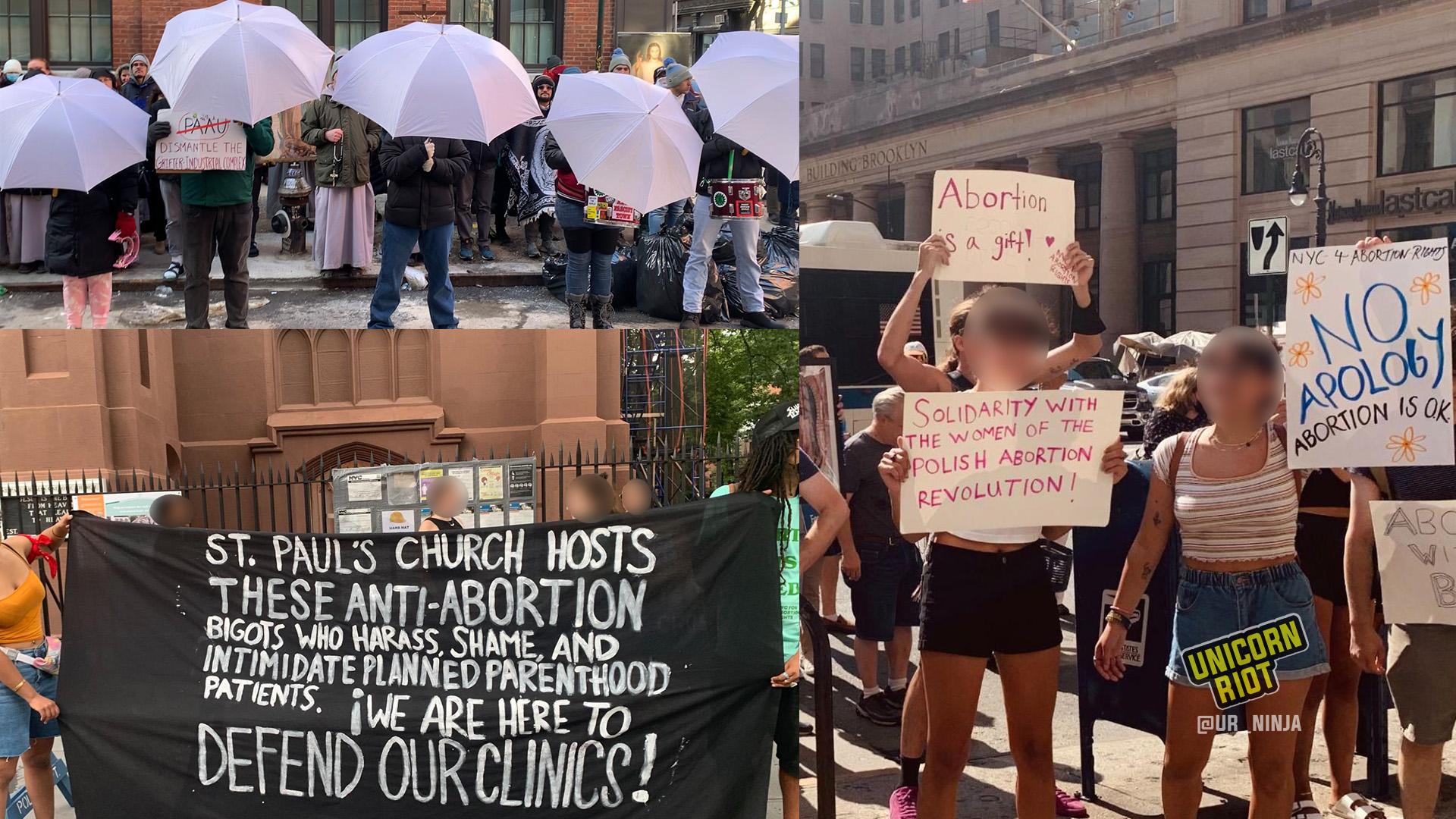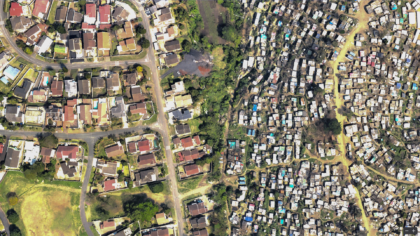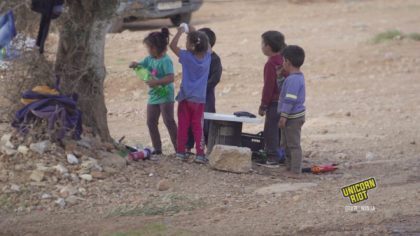A Fight to Defend Abortion in Brooklyn: Clinic Defense and New York City for Abortion Rights
Brooklyn, NY – When a group of Catholic anti-abortion extremists began protesting outside a Planned Parenthood clinic in Brooklyn, a local pro-choice organization called New York City for Abortion Rights (NYCFAR) took to the streets and waged a grassroots campaign to defend open access to abortion without harassment. After months of clinic defense and a community mobilization effort, the Catholic church that had hosted the anti-abortion protesters announced they would stop doing so. Throughout the United States, similar grassroots mobilizations are increasing to match the growing momentum of emboldened anti-choice conservatives.
NYCFAR was founded in 2017, shortly after President Donald Trump’s election, by a group of mostly socialist women who came together out of a shared concern about threats to abortion access. They saw an upcoming protest at a Manhattan Planned Parenthood as an important opportunity to mobilize against anti-abortion forces. The group has been engaging in clinic defense ever since.
When NYCFAR engages in clinic defense throughout New York City, they have multiple goals: to prevent anti-abortion protesters from harassing patients (including by preventing these protesters from reaching the clinic), to highlight the danger posed by the modern anti-abortion movement, to shift the language and framing around abortion, and to build a grassroots movement that will secure free and open access to abortion for all.
In 2021, Witness for Life, a program of the Catholic Archdiocese of New York, began targeting a Brooklyn Planned Parenthood clinic with monthly Saturday protests. Therefore, NYCFAR decided to focus most of their energy on the Parish of St. Paul in Brooklyn, which was hosting the anti-choice protesters.
The Campaign’s Crescendo in August 2021
NYCFAR’s efforts reached a peak at an August clinic defense, when the group faced their first arrests while engaging in clinic defense.
On Saturday, August 14 at 8 a.m., around 25 members of NYCFAR gathered outside St. Paul’s Roman Catholic Church in Cobble Hill, Brooklyn. They handed out a flier to neighbors with information about Witness for Life, the protest group the church was hosting, and about one of its leaders, Fidelis Moscinski.
The NYCFAR protesters formed a moving picket line outside the church, marching in a circle on the sidewalk. They were carrying signs that read, “Abortion is a gift,” “Solidarity with the women of the Polish abortion revolution,” “No apology – Abortion is okay,” “Abortion is care – Abortion is beautiful,” and “This church harasses women,” among other slogans.
Members held a large banner that read, “St. Paul’s Church hosts these anti-abortion bigots who harass, shame, and intimidate Planned Parenthood patients. We are here to defend our clinics!”
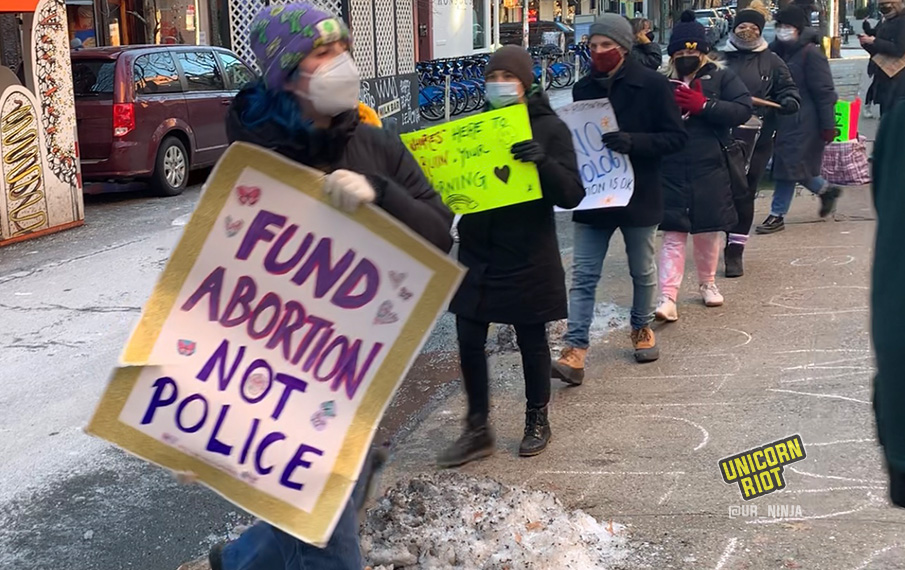
During the picket at the church, protesters chanted messages including, “This church harasses patients,” “This church hosts clinic invaders,” and “No racist cops, no rapist priests, no matter what, we’re in the streets.”
Emily Janakiram, a member of NYCFAR since June 2020, participated in the August action and explained some of its goals.
“The [anti-choice protesters] gather outside of the Planned Parenthood. They not only pray, but they harass and intimidate patients going into the clinic. They pose as clinic escorts to try and intimidate the patients that are trying to enter the clinic, so we’re here to try to get St. Paul’s Church to stop hosting this group, and to show them that they’re not welcome here.”
Emily Janakiram
Protesting directly in front of the NYC churches that host anti-abortion protesters has been controversial. According to one of NYCFAR’s founders, Celia Petty, demonstrating outside churches “is very difficult for some people to decide to do.”
“But we decided that it was important to do it because I just don’t think that you can let the Catholic Church, or any church, off the hook, when they’re the ones that are engaging in this public debate around an issue that really has nothing to do with a church service.”
Celia Petty, co-founder of NYCFAR
Petty first began doing clinic defense in the late 70s in Ohio, and then decided to join with others after Trump’s election to make clinic defense a part of the fight for abortion in NYC.
That August morning as anti-choice protesters left the church, rather than heading directly toward the clinic they headed in the opposite direction, away from the crowd of NYCFAR counter-protesters waiting for them on the sidewalk. NYCFAR sent scouts to follow the procession, and then moved to a side street where they could intercept the anti-choice group.
As the Witness for Life group marched toward the clinic, NYCFAR took up a position in front of them on the sidewalk. As the anti-abortion protesters pushed forward, members of NYCFAR attempted to block their path in order to delay or stop them from arriving at the clinic. A large group of NYPD officers tried to keep the two groups separate, while working to allow Witness for Life’s anti-choice procession to continue forward.
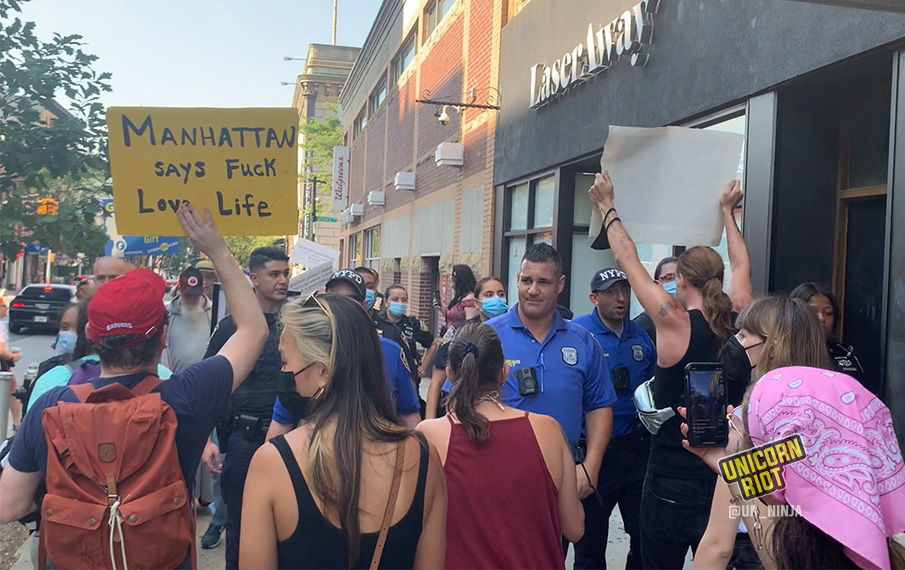
NYCFAR was successful in delaying the procession, and tensions rose between the two opposing groups. As the anti-choice procession turned back toward the main street that would lead them to the clinic, a large group of NYPD officers with the Strategic Response Group (SRG) arrived. The SRG is a militarized anti-riot police squad that is used to suppress protests, and has been consistently accused of committing police brutality against peaceful protesters. (Because of these abuses, the NY chapter of the ACLU is leading a campaign to disband the SRG unit.)
The number of NYPD officers on the sidewalk attempting to push back members of NYCFAR increased, and members of the SRG flanked the group in the street, including a group of officers carrying plastic flex-cuffs used to make mass arrests.
In a pivotal moment, NYCFAR members were walking backward on the sidewalk when the SRG began playing a taped message on a loudspeaker threatening them with arrest for blocking pedestrian traffic. NYCFAR members called for everyone to continue moving backward, and then suddenly the SRG moved in from the street and arrested two NYCFAR marshals, a woman marshal who asked not to be named, and a male marshal named Ed, who asked to be identified only by his first name. These two arrests were the only arrests to happen during NYCFAR-organized actions since the group’s founding in 2017.
According to the woman marshal arrested that day, who is a founding member of NYCFAR and has over five years of clinic defense experience:
“I was shocked because we were moving by that point. And I compare that to past actions where we’ve been more reticent to follow orders. They were clearly militarized, ready to arrest, and they had the vans pulled up. And they basically stormed the street. But at that moment, I was telling people to move back, to move more quickly. I was very clearly moving at a normal pace. And it was really kind of out of the blue. I really did think it was just for show at the beginning. And I just wanted them off me. Because they were so violent. They were so aggressive.”
Woman marshal for NYCFAR, who was arrested opposing anti-choice extremists on August 14, 2021
Ed was arrested shortly after. He’s organized with NYCFAR since 2017, and has also served as a volunteer clinic escort at NYC clinics during that time. “The fact that they had, suddenly out of nowhere, it felt like targeted two of us for arrest – that was surprising,” said Ed.
“I think that there was an idea that arresting two of the people would have a negative effect on NYC for Abortion Rights and other people that were coming to these actions, but it really didn’t. We had a larger turnout for our October action than we did for the August action. And I think [the arrests] were a galvanizing moment for all of us. Because I don’t think any of us felt intimidated. And we feel like it’s meaningful work, because none of those patients deserve to be harassed by any of these anti-abortion people.”
Ed, NYCFAR marshal, arrested August 14, 2021
After the two arrests, members of NYCFAR refused to back down and continued holding space on the sidewalk to delay the procession of anti-abortion protesters.
They continued up Court Street, with NYCFAR members trying to move as slowly as possible without facing any additional arrests. The police walking at the front of the anti-abortion procession continued forcing their way forward.
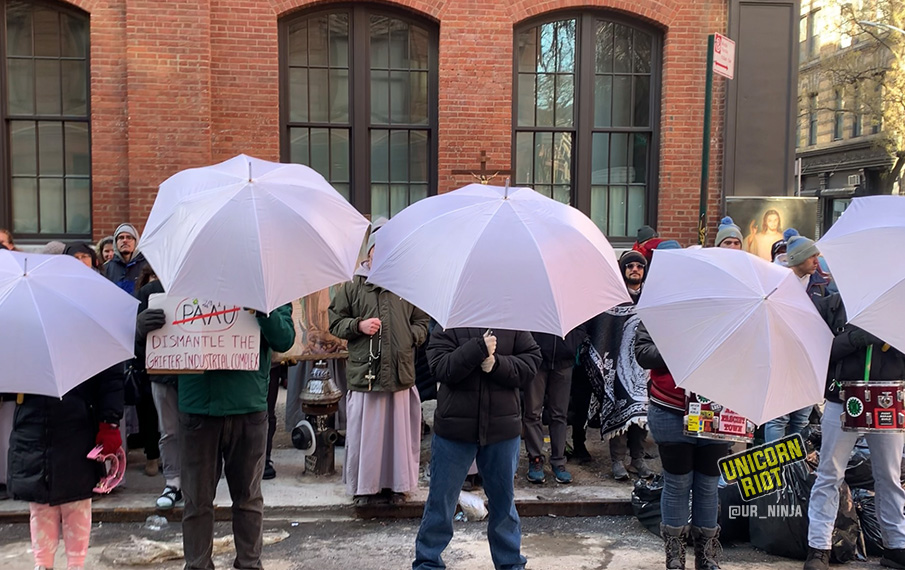
Eventually the group of anti-abortion protesters reached the Planned Parenthood clinic, and NYCFAR members stood in front of them on the sidewalk holding signs so that anyone entering the clinic would not see them. The walk from the Catholic church to the clinic, which should have taken around ten minutes, took over an hour because of NYCFAR’s efforts to delay anti-choice protesters.
NYCFAR Helped Break the Seal
After the August action, NYCFAR worked to expand their coalition in preparation for a September clinic defense, including partnering with racial justice and anti-police advocates who heard about the heavy-handed and abusive arrests by the SRG unit of the NYPD. (The Brooklyn District Attorney’s Office declined to prosecute those two arrests, in part because of videos provided by a local cop-watch group that showed the two NYCFAR members were walking on the sidewalk when they were arrested.)
As NYCFAR was finalizing plans for their September clinic defense, St. Paul’s Roman Catholic Church announced that they would no longer be hosting the Witness for Life procession on Saturday, September 11. According to anti-abortion protesters, the police were too busy on September 11 to provide them with a police escort, and they did not want to protest without police protection. Members of NYCFAR were thrilled that their clinic defense efforts had successfully kept the protesters away that month.
”I thought that once they had broken the seal on postponing – if they could do it once they could do it again. If they weren’t like, ‘hell or high water, we’re gonna do it’ and intractable, that meant there was hope that we could win that campaign because of what had happened in September and them needing a police escort is a win for us, them feeling like they’re not able to do what they want, is a win for us.”
Mike D., NYCFAR
NYCFAR then shifted their focus to October in order to continue to defend the Planned Parenthood clinic and to keep the pressure on the Witness for Life program and the Parish of St. Paul. On Saturday, October 9, NYCFAR met in a park near the church to prepare for the action and to do a brief orientation for new people participating in their first clinic defense. Before the action could start, a NYPD Community Affairs police officer told NYCFAR that Witness for Life was indefinitely suspending their procession and that St. Paul’s Church did not like the negative attention they’d been receiving.
For the second month in a row, the protest at the Brooklyn Planned Parenthood was canceled. NYCFAR held a brief picket outside the church to confirm that no anti-choice protesters were there, and then returned to the park for a celebration and to discuss next steps.
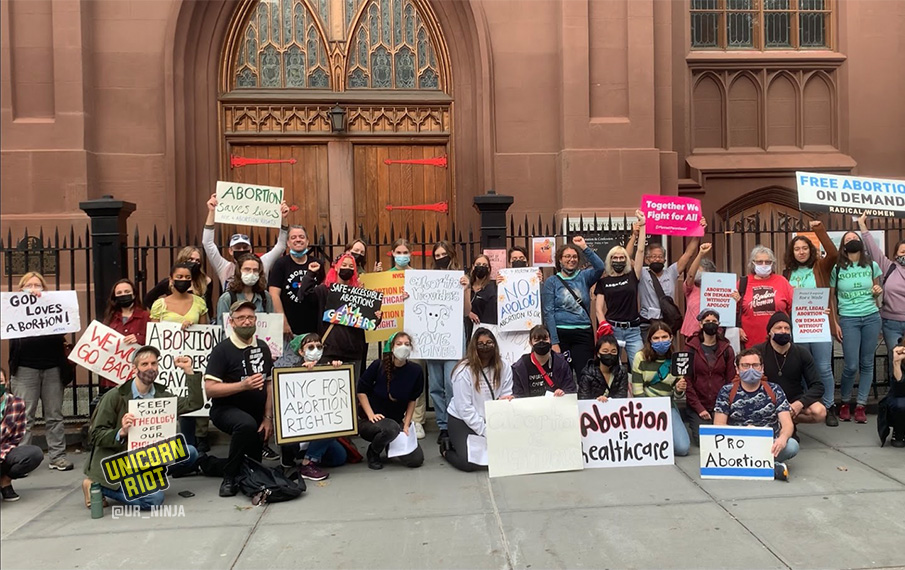
In November, St. Paul’s Roman Catholic Church officially announced that they were going to stop hosting the Witness for Life program. This meant that no additional Witness for Life protests were planned at the Brooklyn Planned Parenthood clinic.
“We were able to get the church to quit hosting that whole coalition of anti-woman, anti-abortion forces. And it wasn’t from legislation, and it wasn’t from court action,” said Celia Petty. “It certainly wasn’t from calling the police. It was from confronting them on the streets and doing serious work to get the community to understand what was going on, and get the community behind what we were doing and get the community to help put pressure on the church.”
A Controversial Tactic
New York City for Abortion Rights uses clinic defense as an organizing method to defend abortion. Clinic defense involves directly confronting the protesters who target health care centers that provide abortion, in contrast to clinic escorts, who focus on supporting patients and who avoid engaging with protesters. Clinic escorting is common throughout the country and is organized in cooperation with clinics, while clinic defense activities are more rare. When clinic defense happens, it is sometimes done in cooperation with the clinic escorts who are also at a clinic, as the two groups can communicate with each other.
The decision to engage in clinic defense is controversial, but for NYCFAR, the benefits outweigh the risks. Many members see abortion access under attack and losing ground, and feel it is important to try new strategies and tactics to change the momentum.
“The reproductive rights movement was in this sort of defensive crouch for years. They weren’t really articulating a vision for what liberation or for reproductive justice could be. They were responding to the right and allowing the right to shape the rhetoric and shape division,” said Megan Lessard, a member of NYCFAR who was involved with the initial meeting and first action in 2017 that led to the creation of the group. Lessard continued, “Not interacting with the clinic protesters, not pushing back on them – I think that when they don’t see any kind of oppositional presence out there, their numbers grow, and over time their tactics escalate.”
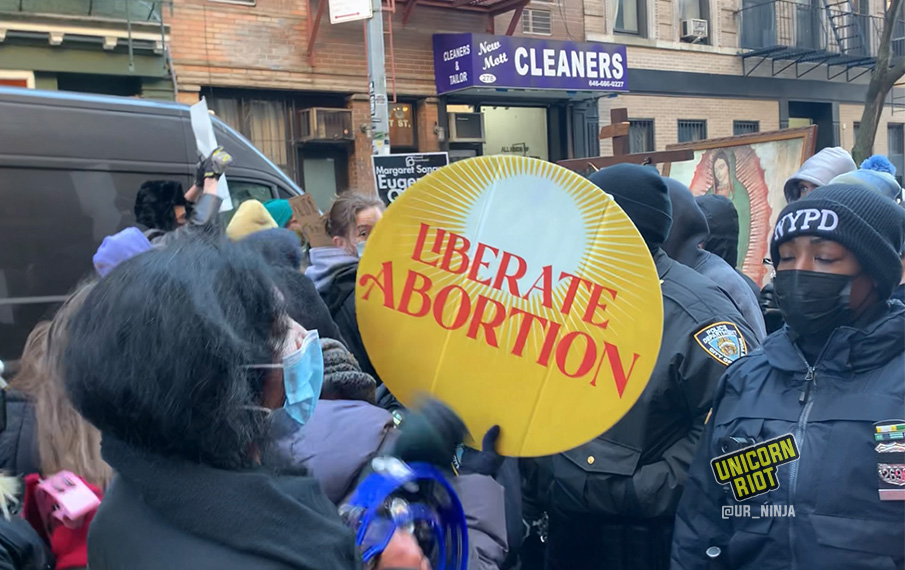
NYCFAR members have many similar reasons for being involved with abortion rights organizing, including having had an abortion or accompanying a partner who was receiving an abortion, being a patient at a clinic where anti-abortion protesters were present, viewing the struggle for abortion as a critical component of liberatory politics, or being impacted by a major historical event such as the assassination of Dr. George Tiller in 2009.
“Most of us had either volunteered for Planned Parenthood, donated to Planned Parenthood, worked at Planned Parenthood, or were Planned Parenthood patients at one time or another in our lives, myself included,” said Celia Petty.
When Planned Parenthood announced that they didn’t want anyone to respond to anti-choice protests at their Brooklyn clinic, NYCFAR discussed the issue and decided to move ahead with their protest anyway. This tension between NYCFAR and providers who do not welcome clinic defense has been an issue throughout their recent campaigning.
The message from NYCFAR has always been that their membership is representative of the people most impacted by the struggle over abortion, with a stake in how the fight for abortion should be waged. As their website attests, “We are Planned Parenthood patients, abortion clinic workers, abortion doulas, and health care providers ourselves. We believe that we should have at least as much say in what the fight for abortion rights should look like as the well-paid administrators and consultants at the top of those organizations.”
While clinic defense has become the most central and visible aspect of NYCFAR organizing, the group engages in many other activities to support abortion. Past NYCFAR actions include educational events about abortion stigma, medication abortion, and the grassroots fight for abortion, movie screenings (Las Mujeres Deciden (Let Women Decide) and After Tiller), solidarity with the global struggle for abortion (including events about Ireland, Argentina, and Poland), fundraisers for funds around the country that help cover the costs of abortion, and participating in left-wing mobilizations in NYC (such as the Queer Liberation March or the campaign to Defund the NYPD).
NYCFAR also makes use of various outreach techniques. They distributed a flyer each month encouraging community members to call the church to ask them to stop hosting the Witness for Life anti-abortion protests. NYCFAR published “An Open Letter to St. Paul in Brooklyn” asking the church to “Stop Harassing Planned Parenthood Patients.” The group also began tabling in front of the church on Sundays, where they talked with church members and community members about the clinic harassment that the church was facilitating.
Mike D. was one of the NYCFAR members who helped organize the tabling to build community support against the clinic harassment. “It felt like we were actually connecting with the community, educating the community, mobilizing the community, getting those petitions signed, and that this was a winnable thing.”
Members believe an organization like NYCFAR is crucial in order to build the grassroots movement in support of abortion. “I think that there’s been less of an appetite for street-level organizing, and I think people kind of forgot what it took to beat back the right in the 80s and the 90s, when they were adopting really, really aggressive militant tactics,” said Megan Lessard. NYCFAR represents part of the resurgence of this street-level organizing on the pro-abortion side.
Witness for Life, the Religious Right, and the Modern Anti-Abortion Movement
One notable leader of the Witness for Life program is Fidelis Moscinski, a Franciscan Friar. A NYCFAR explainer on Moscinski notes that he has been arrested at least nine times conducting clinic invasions with Red Rose Rescue. Red Rose Rescue’s clinic invasions are a resurgence of a tactic from decades ago when anti-abortion protesters would enter clinics in order to harass patients, trying to deter or prevent them from receiving abortions. These militant anti-choice tactics were re-energized under Trump and have rapidly expanded in recent years.
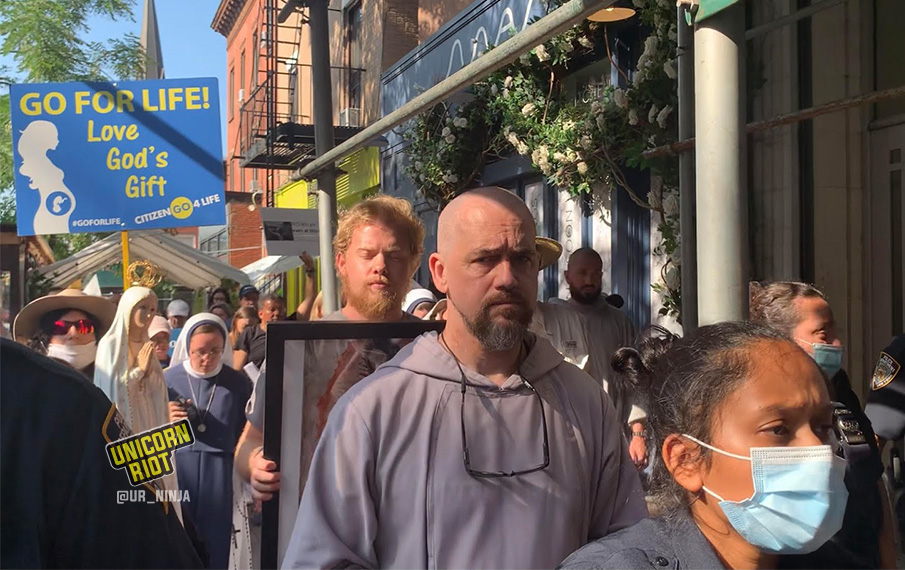
For NYCFAR members, anything that they can do to delay anti-abortion protesters from reaching a clinic means that patients have more chances to receive care without harassment. “Most patients do report feeling harassed, intimidated, in distress, less able to access healthcare [due to these protesters] – it actually can deter someone from getting the abortion that they may need,” said Camila Valle.
“And the number one reason that people get abortions, statistically, is because they can’t afford to raise a child. And so if you show up to your appointment, and you see a swarm of anti-abortion bigots outside who are telling you things, are giving you all this false information, you’re much less likely to access the care that you need. And so it’s not non-violent. It’s forcing someone to carry a pregnancy that they don’t want to, which is extremely traumatic and violent, in and of itself. This kind of facade of morality is only a facade.”
Camila Valle, NYCFAR
At the previous Brooklyn protests outside of Planned Parenthood, members of the group Witness for Life would attempt to disguise themselves as clinic escorts in order to intercept patients to deter them from seeking an abortion. Ed of NYCFAR, who has volunteered as a clinic escort, explained that the fake escorts try to pull patients away from the clinic by “telling them what they’re doing is wrong, erroneously telling them that they’re killing babies, like all this kind of stuff, all this kind of propaganda. So it’s not just those people praying in front of a clinic, part of their group is also peeling off to harass patients as well, and we’ve seen it every single clinic defense.”
In NYC and around the country, anti-abortion organizing, and clinic protests in particular, have become a space for the far-right to mobilize. Megan Lessard wrote an article for Tempest Magazine about these ties:
“Clinic protests have been remarkably effective at drawing together a diverse right-wing base. The parking lots and sidewalks around them function as a commons for conservatives of all political tendencies, from aging parishioners clutching rosaries to the Proud Boys. Walking a gauntlet of protesters is just part of what it takes to access reproductive healthcare in the United States.”
Megan Lessard, NYCFAR
In an interview, Toledo, OH Women’s Center’s clinic escort group leader Kristin Hady told Unicorn Riot that in addition to the daily harassment the clinic and their patients face, the anti-choice, right-wing protesters occasionally take escalated actions. On October 28, 2021, the clinic’s exterior electrical box was set on fire, and the Toledo Fire & Rescue Department investigation ruled it arson and found traces of an accelerant.
Alarmingly, around the country, anti-abortion protests are being organized or attended by the far right, including the Proud Boys, a violent far-right street gang, in Salem, Seattle, Texas, and New York City.
At the anti-abortion March for Life event on January 21, 2022 in Washington D.C., a small contingent of neo-Nazi organization Patriot Front was present. (As the neo-Nazi group was marching, Unicorn Riot published more than 400 gigabytes of data leaks from their chat servers. Ostensibly private, unedited videos and direct messages revealed a campaign to organize acts of racial hatred while indoctrinating teenagers into neo-nazism.)
Julie Bowen of NYCFAR shared a concern that the opposition to abortion is just the beginning of what these protesters want to achieve: “They’re not pro life, they’re not. They’re anti-abortion, and also, anti-women’s rights, anti-women’s birth control, and, I think that their end goal is, once they get rid of abortion clinics, then the next thing that’s happening on the chopping block is birth control. They’re just going to start restricting that.”
(The Witness for Life program, the Archdiocese of New York, and the Parish of St. Paul’s church all declined to respond to requests for comment via phone and email.)
A Nationwide Clinic Defense Effort
The campaign from NYCFAR in Brooklyn was about defending a single Planned Parenthood clinic, but it was also part of the larger struggle for abortion rights. Anne Rumberger, another founding member of NYCFAR, sees clinic defense as important in and of itself, but also as a “part of building the radical movement.”
“I think it’s really necessary to let people know that we’re not going to let the anti-abortion militant forces lead the movement and dictate the rhetoric and the strategy. I think it’s important for actually physically protecting the space, outside and in front of clinics for patient safety, and to support clinic workers and clinic staff.”
Anne Rumberger
Charlotte for Choice is another group that does clinic defense at an abortion provider in North Carolina. Heather Mobley is a Board member of Charlotte for Choice and has been doing clinic defense with them since 2017.
Mobley noted how important the communication and collaboration is between groups that do clinic defense: “A lot of it’s really trial and error, of figuring out what works and what doesn’t work within your space and with your particular protesters. And also being able to talk to other groups who do engage [protesters]. We’re just trying to make sure that the patients are able to get in and feel comfortable and supported in that environment. So it’s been helpful to have these other groups that you can talk about it and feel supported.”
Both Mobley and NYCFAR members noted that some of the prominent anti-abortion protesters travel the country, protesting at a variety of clinics, and an important benefit to the collaborative relationship among clinic defenders is to warn each other about who might be coming to their city, and to provide information about how to handle these specific protesters.
One example of a common strategy from clinic defense groups is turning to social media to build support for their organizing. “I think social media, particularly with Tik Tok, people have been able to see what this looks like,” said Mobley. “That it’s not sweet, peaceful Christians just praying on the sidewalk. And, we just love people to see the really hateful and awful behavior that most of these protesters exhibit. I think that’s had an impact,” Mobley continued. Examples of Tik Tok accounts from clinic defenders include NYCFAR, Charlotte for Choice, and the Deathscorts in Nebraska.
For NYCFAR, a key question is how they seize this moment when attention all over the country is focused on abortion, and how they work to build a larger movement. “Once you get that attention, you’re going to find that a lot of people are really against this kind of injustice and this kind of harassment,” said Ed.
“It’s not hard to find allies – shine that light on it, talk a lot about it, and get as many people as you can involved, including the community to fight against, and you can win. The more people that we have doing clinic defense, the much better chance we have of being successful.”
Ed, NYCFAR
According to Celia Petty, as the nationwide movement for protecting abortion rights grows, she’d “like to see a couple hundred thousand people marching down Pennsylvania Avenue in Washington, DC and surrounding the Capitol, at a respectful distance, to let Congress know how strongly we feel about it.”
Follow us on X (aka Twitter), Facebook, YouTube, Vimeo, Instagram, Mastodon, Threads, BlueSky and Patreon.
Unicorn Riot's coverage on Abortion and Reproductive Rights:
- FBI Harasses Activists in Florida; Two Indicted on Federal Charges for Jane’s Revenge Actions - Feb. 26, 2023
- Richmond Abortion Rights Rally Highlights Intersections of SCOTUS Ruling - July 29, 2022
- July 4th Abortion Protests in Washington, D.C. - July 4, 2022
- The End of Federal Abortion Protections Isn’t the End of Abortion Access - June 25, 2022
- Dozens in Boulder Protest Christian Nationalist Group and its Spreading of Extremism - June 23, 2022
- Leaked U.S. Supreme Court Abortion Draft Decision Incites Protests - May 3, 2022
- A Fight to Defend Abortion in Brooklyn: Clinic Defense and New York City for Abortion Rights - April 9, 2022
- Freedom of Choice Under Fire in Ohio - Jan. 5, 2022
- “Abortion is Sacred:” The Past and Present of Reproductive Rights - Oct. 14, 2021
- Patients Face Daily Harassment Outside Planned Parenthood in Denver - Nov. 10, 2018
Please consider a tax-deductible donation to help sustain our horizontally-organized, non-profit media organization:

